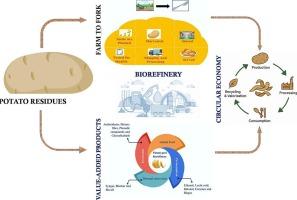马铃薯废弃物的系统增值和循环生物经济前景综述
Q1 Environmental Science
引用次数: 0
摘要
马铃薯是世界上种植和消费最广泛的粮食作物之一,其产量稳步上升,以满足全球粮食需求。在这种增长的同时,马铃薯产品的工业加工产生了大量的废物流,包括果皮、土豆泥、纸浆和加工用水,这些废物往往在没有商业利用的情况下被丢弃。这些残留物富含碳水化合物、蛋白质和生物活性化合物,使它们成为提取和生物转化为各种增值产品的有吸引力的底物。新兴研究表明,它们在生产生物燃料、有机酸、酶、类胡萝卜素、脂类、营养品、肥料和生物能源相关产品方面具有潜力。马铃薯秸秆价值化不仅提高了资源效率,而且支持循环经济原则,减轻了环境负担。本综述通过文献计量学和系统分析scopus检索的出版物(2015-2025)来综合当前的进展,并辅以使用VOSviewer进行关键词共现映射,以捕捉研究热点、技术路径和可持续性联系。研究结果强调,马铃薯废物增值对可持续发展目标(sdg)有重大贡献,特别是通过促进负责任的生产和消费(SDG12),实现清洁和可再生能源发电(SDG7),以及减轻负面环境影响(sdg 6、11、13、14和15)。此外,将马铃薯渣价值整合到产业共生中可以加强创新、基础设施和经济增长(可持续发展目标8和9)。总的来说,马铃薯废料代表了生物炼制应用的多功能原料,提供了一个将循环经济战略与可持续发展目标相结合的整体模型。本文章由计算机程序翻译,如有差异,请以英文原文为准。

Systematic valorisation and circular bioeconomy prospects from potato wastes: A review
Potato is among the most widely cultivated and consumed food crops worldwide, with production steadily rising to meet global food demands. Alongside this growth, industrial processing of potato-based products generates substantial amounts of waste streams, including peels, mash, pulp, and process water, that are often discarded without commercial utilization. These residues are rich in carbohydrates, proteins, and bioactive compounds, making them attractive substrates for extraction and bioconversion into a wide range of value-added products. Emerging studies demonstrate their potential for producing biofuels, organic acids, enzymes, carotenoids, lipids, nutraceuticals, fertilizers and bioenergy-related products. Valorization of potato residues not only enhances resource efficiency but also supports circular economy principles and reduces environmental burden. This review synthesizes current advances through a bibliometric and systematic analysis of SCOPUS-indexed publications (2015–2025), complemented by keyword co-occurrence mapping using VOSviewer to capture research hotspots, technological pathways, and sustainability linkages. The findings highlight that potato waste valorization contributes significantly to Sustainable Development Goals (SDGs), particularly by promoting responsible production and consumption (SDG12), enabling clean and renewable energy generation (SDG7), and mitigating negative environmental impacts (SDGs 6, 11, 13, 14, and 15). Furthermore, integrating potato residue valorization into industrial symbiosis strengthens innovation, infrastructure, and economic growth (SDGs 8 and 9). Overall, potato waste represents a versatile feedstock for biorefinery applications, offering a holistic model that integrates circular economy strategies with sustainable development objectives.
求助全文
通过发布文献求助,成功后即可免费获取论文全文。
去求助
来源期刊

Bioresource Technology Reports
Environmental Science-Environmental Engineering
CiteScore
7.20
自引率
0.00%
发文量
390
审稿时长
28 days
 求助内容:
求助内容: 应助结果提醒方式:
应助结果提醒方式:


